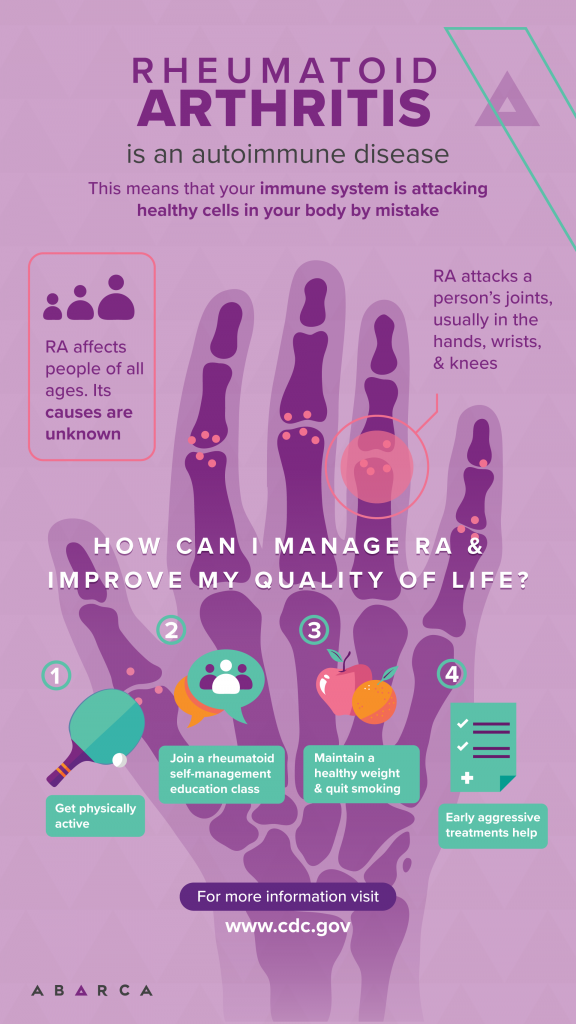It’s Rheumatoid Arthritis [RA] Awareness Week (June 17-23) and Abarca goes all in to bring awareness to the 1.5 million Americans, most of which are women, who suffer from this condition by sharing information on its signs, symptoms, and treatments.
What is rheumatoid arthritis (RA)?
RA is an autoimmune and inflammatory disease, which means that your immune system is attacking healthy cells in your body by mistake, causing inflammation (painful swelling) in the affected parts of the body. RA typically attacks a person’s joints, usually many joints at once, and most commonly the small joints in the hands, wrists, and knees. RA is the most common cause of inflammatory arthritis.

Though we know how RA works, the causes of this condition are unknown. However, through much research on genetic and environmental factors, certain risk factors have been indicated such as:
–Age: Despite popular belief that it is a condition of the old, RA can begin at any age, but it has been shown to be more prevalent in people of older age, especially in adults in their sixties.
–Sex: Typically, women RA cases are 2 to 3 times more likely than men cases.
–Genetics/inherited traits: People born with HLA (human leukocyte antigen) class II genotypes are more likely to develop RA. The risk of RA may be highest when people with these genes are exposed to environmental factors like smoking or obesity.
–Smoking: Multiple studies show that cigarette smoking increases a person’s risk of developing RA and can even worsen the disease.
–History of live births: Women who have never given birth may be at greater risk of developing RA.
–Early Life Exposures: Some early life exposures may increase the risk of developing RA in adulthood. For example, one study found that children whose mothers smoked had double the risk of developing RA as adults. Also, it has been found that children of lower-income families are at increased risk of developing the condition as adults.
–Obesity: Being obese can increase the risk of developing RA. Studies examining the role of obesity also found that the more overweight a person was, the higher his or her risk of developing RA became.
How can I manage RA and improve my quality of life?
RA affects many aspects of daily living including work, leisure, and social activities. Fortunately, there are multiple low-cost strategies available that are proven to increase a person’s quality of life.
Get physically active. Experts recommend that ideally, adults be moderately physically active for 150 minutes per week, through activities like walking, swimming, or biking 30 minutes a day for five days a week. Of course, you can divide these 30-minute into three intervals of ten-minute sessions throughout the day. Learn more about physical activity for arthritis.
Join a self-management education class. People with inflammatory arthritis (including RA) gain confidence when they learn how to control their symptoms. Learn more about the proven self-management education programs that the CDC recommends.
Stop Smoking. Cigarette smoking makes RA worse and can cause other medical problems. Smoking can also make it more difficult to stay physically active, which is an important part of managing RA.
Maintain a Healthy Weight. Being overweight can cause increased pain and mobility problems for people with RA, so it’s important to maintain a healthy weight.
In addition to medications, people who suffer from RA can manage the condition through self-management strategies proven to reduce pain and disability, which in the long run can improve their quality of life and relieve daily pains so that they may live as normal as possible. Also, people with RA can improve joint function by learning to use five simple and effective arthritis management strategies.
For more information about the treatment of RA, review the Clinical Practice Guidelines for the Treatment of Rheumatoid Arthritis from the American College of Rheumatology (ACR) or the ACR’s Rheumatoid Arthritis Patient page.
Rheumatoid Arthritis Awareness Weekto the RA community and sharing the message that it can affect anyone of any age. Join us in our mission for better care and help us spread information on healthier living habits, and ensure that the best possible, innovative treatments reach the patients who need them.
—
This blog was written by Lillian Colón López, MPH, Pharm. D., Clinical Client Advisor at Abarca Health.